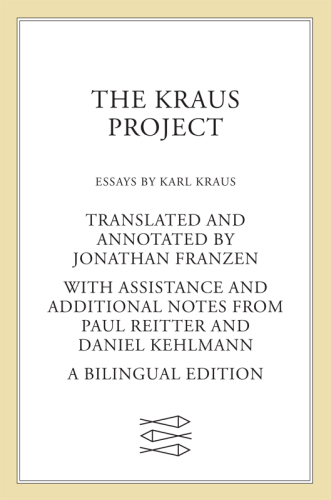
The Kraus Project
Essays by Karl Kraus
کتاب های مرتبط
- اطلاعات
- نقد و بررسی
- دیدگاه کاربران
نقد و بررسی

September 9, 2013
Franzen (Freedom) approaches his latest project with characteristic ambition: to provide an accessible translation of key essays by the early 19th-century Austrian critic Karl Kraus (1874–1936), explain and contextualize Kraus’s biting satire, come to terms with the young man he was when he first encountered the self-styled “wrathful prophet,” and draw contemporary relevance from Kraus’s work. The result is clear, polished, and often funny—no small accomplishment, given Kraus’s notoriously difficult to translate prose. Franzen has similar aims; he leaves to Reitter the scholarly legwork of explaining obscure cultural references and providing analysis, and instead uses the copious footnotes to provide current analogies for Kraus’s targets and reflect on his own studies in Germany, which lead to meditations on his upbringing, relationships, literary aspirations, and search for a literary father. Several footnotes extend for pages, turning Kraus into background music for scholarly speculation and ruminations. When the narratives coalesce, the “spasm of pleasure” amply repays the reader’s dogged attention, revealing two literary minds operating at the peak of their maturity and strength. Agent: Susan Golomb, Susan Golomb Agency.

September 1, 2013
Two angry men rail against their culture. Franzen (Farther Away: Essays, 2012, etc.) discovered Austrian essayist, playwright and poet Karl Kraus (1874-1936) when he studied in Berlin in 1981-1982. A prominent social critic in early-20th-century Vienna, Kraus had been long forgotten, but his work resonated with Franzen, who saw the sharp, bitter writer as a kindred spirit. Franzen calls Kraus a "farseeing prophet" who hated, above all, the media, which thrived on gossip and was antagonistic to the "kind of spirituality/imaginativeness that, as Kraus saw it, makes us human." As a kind of homage, Franzen has translated four of Kraus' essays for this bilingual, profusely annotated edition. He warns readers that Kraus is a difficult writer, and in translation, his work comes across as stilted and awkward. The essays themselves, however, may be less interesting to readers than the extensive annotations. Sometimes a few lines by Kraus, for example, are followed by several pages of notes: Franzen's autobiographical ruminations and detailed, informative historical context by Ohio State professor Paul Reitter. Novelist Daniel Kehlmann, a friend of Franzen, also rings in with comments. Franzen's personal reflections focus on his response to Kraus, his early ambitions and frustrations as a writer, his engagement to the woman he eventually married and the reasons he embraced "anger as a way of life" at the age of 22. Although he claims that he has outgrown his former rage, like Kraus, he is critical of much in his own culture: Apple products, Steve Jobs, French literary theory, Salman Rushdie's tweets, 1,000-page biographies, the blogosphere, Amazon, John Updike, social media, Facebook and assaults to the natural environment. Readers interested in Kraus will be better served by Reitter's The Anti-Journalist: Karl Kraus and Jewish Self-Fashioning (2008). This book is for Franzen's fans.
COPYRIGHT(2013) Kirkus Reviews, ALL RIGHTS RESERVED.

Starred review from September 15, 2013
Karl Kraus (18741936) was a Viennese satirist who lashed his contemporaries with uncommon savagery and wit. His work is hard to read and hard to translate, and it has become seriously opaque, steeped as it often is in the now-obscure cultural controversies of turn-of-the-century Vienna. And yet, suggests Jonathan Franzen, who first read Kraus as an angry young person adrift in Berlin, Kraus' commentaries on the intellectual vulgarities of his age (the pulpy feuilleton sections from the Viennese paper, for example) also apply to our own media-saturated, technology-crazed, apocalypse-haunted historical moment. So Franzen, assisted by Kraus scholar Paul Reitter and Viennese novelist Daniel Kehlmann (Measuring the World, 2006), gives us a guided tour of Kraus' 1910 essay Heine and the Consequences and a few other works. Franzen has a point. Kraus' observations about mass-media responsibility for the destabilization endemic to modernity, once unpacked from Krauss' highly stylized sentences, sound eminently familiar. For many readers, however, the highlight of this book will be the coming-of-age story Franzen tells in the footnotes about his own journey through the apocalyptic and the megalomaniacal as he struggled with loneliness, writing, and love. Why can't more literary explication engage one's heart and one's head at the same time?(Reprinted with permission of Booklist, copyright 2013, American Library Association.)

May 1, 2013
Not fiction, but this book should hold you until another grand-scale Franzen novel appears. Viennese satirist Kraus flourished in the first third of the 20th century, influencing writers like Franz Kafka and Walter Benjamin as he gleefully skewered consumerist excess, media frenzy, and the last-gasp militarism of a doomed empire. Franzen translates his thorny and uncompromising essays while offering extended annotations that pull Kraus into today's culture.
Copyright 2013 Library Journal, LLC Used with permission.

























دیدگاه کاربران